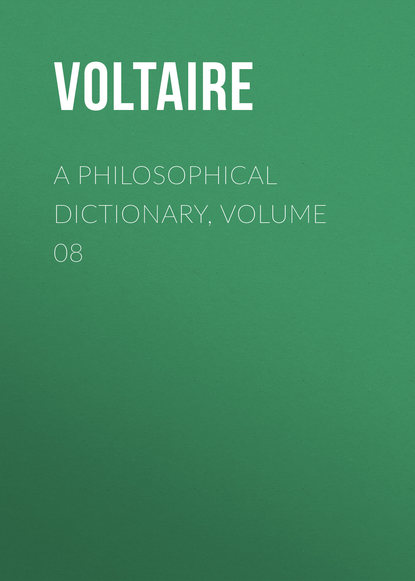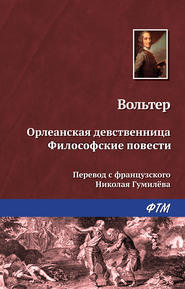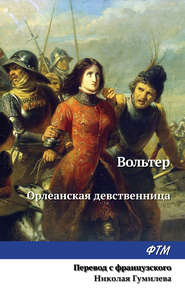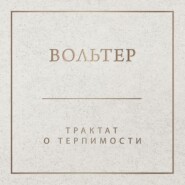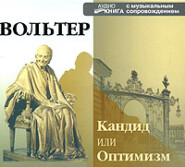По всем вопросам обращайтесь на: info@litportal.ru
(©) 2003-2024.
✖
A Philosophical Dictionary, Volume 08
Настройки чтения
Размер шрифта
Высота строк
Поля
Alas! my good friends! you none of you know how you originate your own offspring; you are ignorant of the secrets of nature in your own species, and yet vainly attempt to develop them in the mule!
It may, however, be confidently presumed, in reference to a monster by defect, that the whole seminal matter did not reach its destined appropriation; or, perhaps, that the small spermatic worm had lost a portion of its substance; or, perhaps that the egg was crazed and injured. With respect to a monster by excess, you may imagine that some portions of the seminal matter superabounded; that of two spermatic worms united, one could only animate a single member of the animal, and that that member remains in supererogation; that two eggs have blended together, and that one of them has produced but a single member, which was joined to the body of the other.
But what would you say of so many monstrosities arising from the addition of parts of animals of a totally different species? How would you explain a crab on the neck of a girl? or the tail of a rat upon the thigh? or, above all, the four dugs and tail of a cow, which was exhibited at the fair at St. Germain? You would be reduced to the supposition that the unfortunate woman's mother belonged to the very extraordinary family of Pasiphæ.
Let each of us boldly and honestly say, How little is it that I really know.
MORALITY
Babblers, preachers, extravagant controversialists! endeavor to remember that your master never announced that the sacrament was the visible sign of an invisible thing; He has nowhere admitted four cardinal virtues, and three divine ones. He has never decided whether His mother came into the world maculate or immaculate. Cease, therefore, to repeat things which never entered into His mind. He has said, in conformity with a truth as ancient as the world – Love God and your neighbor. Abide by that precept, miserable cavillers! Preach morality and nothing more. Observe it, and let the tribunals no longer echo with your prosecutions; snatch no longer, by the claw of an attorney, their morsel of bread from the widow and the orphan. Dispute not concerning some petty benefice with the same fury as the papacy was disputed in the great schism of the West. Monks! place not to the utmost of your power, the universe under contribution, and we may then be able to believe you. I have just read these words in a piece of declamation in fourteen volumes, entitled, "The History of the Lower Empire"; "The Christians had a morality, but the Pagans had none."
Oh, M. Le Beau! author of these fourteen volumes, where did you pick up this absurdity? What becomes of the morality of Socrates, of Zaleucus, of Charondas, of Cicero, of Epictetus, and of Marcus Aurelius?
There is but one morality, M. Le Beau, as there is but one geometry. But you will tell me that the greater part of mankind are ignorant of geometry. True; but if they apply a little to the study of it, all men draw the same conclusions. Agriculturists, manufacturers, artisans, do not go through a regular course of morality; they read neither the "De Finibus" of Cicero, nor the "Ethics" of Aristotle; but as soon as they reflect, they are, without knowing it, disciples of Cicero. The Indian dyer, the Tartarian shepherd, and the English seaman, are acquainted with justice and injustice. Confucius did not invent a system of morals, as men construct physical systems. He found his in the hearts of all mankind.
This morality existed in the bosom of the prætor Festus, when the Jews pressed him to put Paul to death for having taken strangers into their temple. "Learn," said he, "that the Romans never condemn any one unheard."
If the Jews were deficient in a moral sense, the Romans were not, and paid it homage.
There is no morality in superstition; it exists not in ceremonies, and has nothing to do with dogmas. We cannot repeat too frequently that dogmas differ, but that morality is the same among all men who make use of their reason. Morality proceeds from God, like light; our superstitions are only darkness. Reflect, reader; pursue the truth, and draw the consequences.
MOSES
SECTION I
Philosophy, of which we sometimes pass the boundaries, researches of antiquity, and the spirit of discussion and criticism, have been carried so far that several learned men have finally doubted if there ever was a Moses, and whether this man was not an imaginary being, such as were Perseus, Bacchus, Atlas, Penthesilea, Vesta, Rhea Silvia, Isis, Sammonocodom, Fo, Mercury, Trismegistus, Odin, Merlin, Francus, Robert the Devil, and so many other heroes of romance whose lives and prowess have been recorded.
It is not very likely, say the incredulous, that a man ever existed whose life is a continual prodigy.
It is not very likely that he worked so many stupendous miracles in Egypt, Arabia, and Syria, without their being known throughout the world.
It is not likely that no Egyptian or Greek writer should have transmitted these miracles to posterity. They are mentioned by the Jews alone; and in the time that this history was written by them, they were not known to any nation – not indeed until towards the second century. The first author who expressly quotes the Book of Moses is Longinus, minister of Queen Zenobia, in the time of the emperor Aurelian.
It is to be remarked that the author of the "Mercury Trismegistus," who certainly was an Egyptian, says not a single word about this Moses.
If a single ancient author had related a single one of these miracles, Eusebius would no doubt have triumphed in this evidence, either in his "History" or in his "Evangelical Preparation."
It is true, he mentions authors who have quoted his name, but none who have cited his prodigies. Before him, the Jews, Josephus and Philo, who have so much celebrated their own nation, sought all the writers in which the name of Moses is found, but there was not a single one who made the least mention of the marvellous actions attributed to him.
In this silence of the whole world, the incredulous reason with a temerity which refutes itself.
The Jews are the only people who possessed the Pentateuch, which they attribute to Moses. It is said, even in their books, that this Pentateuch was not known until the reign of their king Josiah, thirty-six years before the destruction and captivity of Jerusalem; and they then only possessed a single copy, which the priest Hilkiah found at the bottom of a strong box, while counting money. The priest sent it to the king by his scribe Shaphan. All this, say they, necessarily obscures the authenticity of the Pentateuch.
In short, if the Pentateuch was known to all the Jews, would Solomon – the wise Solomon, inspired by God Himself to build a temple – have ornamented this temple with so many statues, contrary to the express order of Moses?
All the Jewish prophets, who prophesied in the name of the Lord from the time of Moses till that of King Josiah, would they not have been supported in all their prophecies by the laws of Moses? Would they not a thousand times have quoted his own words? Would they not have commented upon them? None of them, however, quote two lines – no one follows the text of Moses – they even oppose them in several places.
According to these unbelievers, the books attributed to Moses were only written among the Babylonians during the captivity, or immediately afterwards by Esdras. Indeed, we see only Persian and Chaldæan terminations in the Jewish writings: "Babel," gate of God; "Phegor-beel," or "Beel-phegor," god of the precipices; "Zebuth-beel," or "Beel-zebuth," god of insects; "Bethel," house of God; "Daniel," judgment of God; "Gabriel," man of God; "Jahel," afflicted of God; "Jael," the life of God; "Israel," seeing God; "Oviel," strength of God; "Raphael," help of God; "Uriel," fire of God.
Thus, all is foreign in the Jewish nation, a stranger itself in Palestine; circumcision, ceremonies, sacrifices, the ark, the cherubim, the goat Hazazel, baptism of justice, simple baptism, proofs, divination, interpretation of dreams, enchantment of serpents – nothing originated among these people, nothing was invented by them.
The celebrated Lord Bolingbroke believed not that Moses ever existed; he thought he saw in the Pentateuch a crowd of contradictions and puzzling chronological and geographical faults; names of towns not then built, precepts given to kings at a time when not only the Jews had no kings, but in which it is probable there were none, since they lived in deserts, in tents, in the manner of the Bedouin Arabs.
What appears to him above all the most palpable contradiction is the gift of forty-eight cities with their suburbs, made to the Levites in a country in which there was not a single village; and it is principally on these forty-eight cities that he refutes Abbadie, and even has the cruelty to treat him with the aversion and contempt of a lord of the Upper Chamber, or a minister of state towards a petty foreign priest who would be so impertinent as to reason with him.
I will take the liberty of representing to Viscount Bolingbroke, and to all those who think with him, not only that the Jewish nation has always believed in the existence of Moses, and in that of his books, but that even Jesus Christ has acknowledged him. The four Gospels, the Acts of the Apostles, recognize him. St. Matthew says expressly, that Moses and Elias appeared to Jesus Christ on the mountain during the night of the transfiguration, and St. Luke says the same.
Jesus Christ declares in St. Matthew that he is not come to abolish this law, but to accomplish it. In the New Testament, we are often referred to the law of Moses and to the prophets. The whole Church has always believed the Pentateuch written by Moses; and further, of five hundred different societies, which have been so long established in Christendom, none have ever doubted the existence of this great prophet. We must, therefore, submit our reason, as so many men have done before us.
I know very well that I shall gain nothing in the mind of the viscount, or of those of his opinion. They are too well persuaded that the Jewish books were not written until very late, and during the captivity of the two tribes which remained. But we shall possess the consolation of having the Church with us.
SECTION II
If you would be instructed and amused with antiquity, read the life of Moses in the article on "Apocrypha."
In vain have several scholars believed that the Pentateuch could not have been written by Moses. They say that it is affirmed even by the Scripture, that the first known copy was found in the time of King Josiah, and that this single copy was brought to the king by the secretary Shaphan. Now, between the time of Moses and this adventure of the secretary Shaphan, there were one thousand one hundred and sixty-seven years, by the Hebrew computation. For God appeared to Moses in the burning bush, in the year of the world 2213, and the secretary Shaphan published the book of the law in the year of the world 3380. This book found under Josiah, was unknown until the return from the Babylonish captivity; and it is said that it was Esdras, inspired by God, who brought the Holy Scriptures to light.
But whether it was Esdras or another who digested this book is absolutely indifferent, since it is inspired. It is not said in the Pentateuch, that Moses was the author; we might, therefore, be permitted to attribute it to the declaration of some other divine mind, if the Church had not decided that the book is by Moses.
Some opposers add, that no prophet has quoted the books of the Pentateuch, that there is no mention of it either in the Psalms or in the books attributed to Solomon, in Jeremiah or Isaiah, or, in short, in any canonical book of the Jews. Words answering to those of Genesis, Exodus, Numbers, Leviticus, Deuteronomy, are not found in any other language recognized by them as authentic. Others, still more bold, have put the following questions:
1. In what language could Moses have written in a savage desert? It could only be in Egyptian; for by this same book we are told that Moses and all his people were born in Egypt. It is therefore probable that they spoke no other language. The Egyptians had yet made no use of papyrus; they engraved hieroglyphics on tables of wood or marble. It is even said, that the tables of the commandments were engraved on polished stones, which required prodigious time and labor.
2. Is it likely, that in a desert where the Jewish people had neither shoemaker nor tailor – in which the God of the universe was obliged to work a continual miracle to preserve the old dresses and shoes of the Jews – men could be found clever enough to engrave the five books of the Pentateuch on marble or wood? You will say, that they found laborers who made a golden calf in one night, and who afterwards reduced the gold into powder – an operation impracticable to common chemistry, which was not yet discovered. Who constructed the tabernacle? Who ornamented thirty columns of brass with capitals of silver? Who wove and embroidered veils of linen with hyacinth, purple, and scarlet? An account that supports the opinion of the contradictors. They answer, that it was not possible that in a desert, where they were in want of everything, for them to perform works so intricate; that they must have begun by making shoes and tunics; that those who wanted necessaries could not indulge in luxuries; and that it is an evident contradiction to say, that they had founders, engravers, and embroiderers, when they had neither clothes nor bread.
3. If Moses had written the first chapter of Genesis, would all young people have been forbidden to read the first chapter? Would so little respect have been paid to the legislator? If it was Moses who said that God punished the iniquity of the fathers to the fourth generation, would Ezekiel have dared to say the contrary?
4. If Moses wrote Leviticus, could he have contradicted it in Deuteronomy? Leviticus forbids a woman to marry her brother, Deuteronomy commands it.
5. Could Moses have spoken of towns which existed not in his time? Would he have said that towns which, in regard to him, were on the east of the Jordan were on the west?
6. Would he have assigned forty-eight cities to the Levites, in a country in which there were never ten, and in a desert in which he had always wandered without habitation?
7. Would he have prescribed rules for the Jewish kings, when not only there were no kings among this people, but they were held in horror, and it was not probable they would ever have any? What! would Moses have given precepts for the conduct of kings who came not until five hundred years after him, and have said nothing in relation to the judges and priests who succeeded him? Does not this religion lead us to believe that the Pentateuch was composed in the time of kings, and that the ceremonies instituted by Moses were only traditional.
8. Suppose he had said to the Jews: I have made you depart to the number of six hundred thousand combatants from the land of Egypt under the protection of your God? Would not the Jews have answered him: You must have been very timid not to lead us against Pharaoh of Egypt; he could not have opposed to us an army of two hundred thousand men. There never was such an army on foot in Egypt; we should have conquered them easily; we should have been the masters of their country. What! has the God, who talks to you, to please us slain all the first-born of Egypt, which, if there were in this country three hundred thousand families, makes three hundred thousand men destroyed in one night, simply to avenge us, and yet you have not seconded your God and given us that fertile country which nothing could withhold from us. On the contrary you have made us depart from Egypt as thieves and cowards, to perish in deserts between mountains and precipices. You might, at least, have conducted us by the direct road to this land of Canaan, to which we have no right, but which you have promised us, and on which we have not yet been able to enter.
It was natural that, from the land of Goshen, we should march towards Tyre and Sidon, along the Mediterranean; but you made us entirely pass the Isthmus of Suez, and re-enter Egypt, proceed as far as Memphis, when we find ourselves at Beel-Sephor on the borders of the Red Sea, turning our backs on the land of Canaan, having journeyed eighty leagues in this Egypt which we wished to avoid, so as at last to nearly perish between the sea and the army of Pharaoh!
If you had wished to deliver us to our enemies, you could not have taken a different route and other measures. God has saved us by a miracle, you say; the sea opened to let us pass; but after such a favor, should He let us die of hunger and fatigue in the horrible deserts of Kadesh-barnea, Mara, Elim, Horeb, and Sinai? All our fathers perished in these frightful solitudes; and you tell us, at the end of forty years, that God took particular care of them.
This is what these murmuring Jews, these unjust children of the vagabonds who died in the desert, might have said to Moses, if he had read Exodus and Genesis to them. And what might they not have said and done on the article of the golden calf? What! you dare to tell us that your brother made a calf for our fathers, when you were with God on the mountain? You, who sometimes tell us that you have spoken to God face to face, and sometimes that you could only see His back! But no matter, you were with this God, and your brother cast a golden calf in one day, and gave it to us to adore it; and instead of punishing your unworthy brother, you make him our chief priest, and order your Levites to slay twenty-three thousand men of your people. Would our fathers have suffered this? Would they have allowed themselves to be sacrificed like so many victims by sanguinary priests? You tell us that, not content with this incredible butchery, you have further massacred twenty-four thousand of our poor followers because one of them slept with a Midianitish woman, whilst you yourself espoused a Midianite; and yet you add, that you are the mildest of men! A few more instances of this mildness, and not a soul would have remained.
No; if you have been capable of all this cruelty, if you can have exercised it, you would be the most barbarous of men, and no punishment would suffice to expiate so great a crime.
These are nearly the objections which all scholars make to those who think that Moses is the author of the Pentateuch. But we answer them, that the ways of God are not those of men; that God has proved, conducted, and abandoned His people by a wisdom which is unknown to us; that the Jews themselves, for more than two thousand years, have believed that Moses is the author of these books; that the Church, which has succeeded the synagogue, and which is equally infallible, has decided this point of controversy; and that scholars should remain silent when the Church pronounces.
SECTION III





